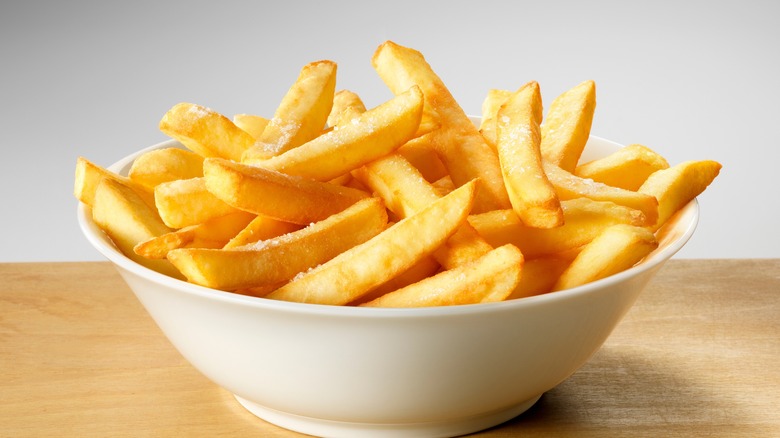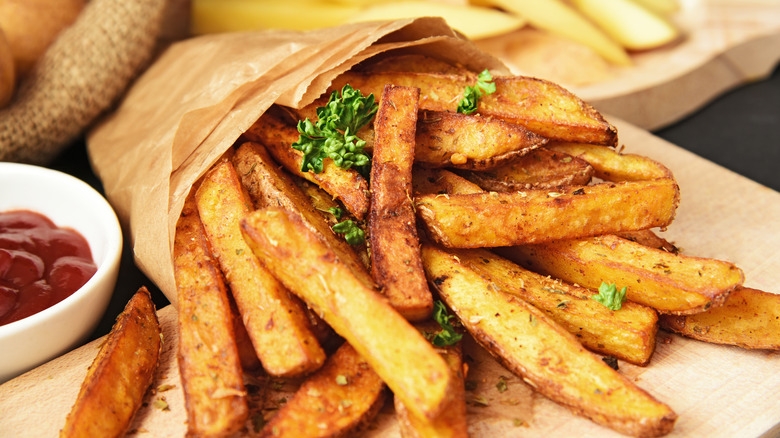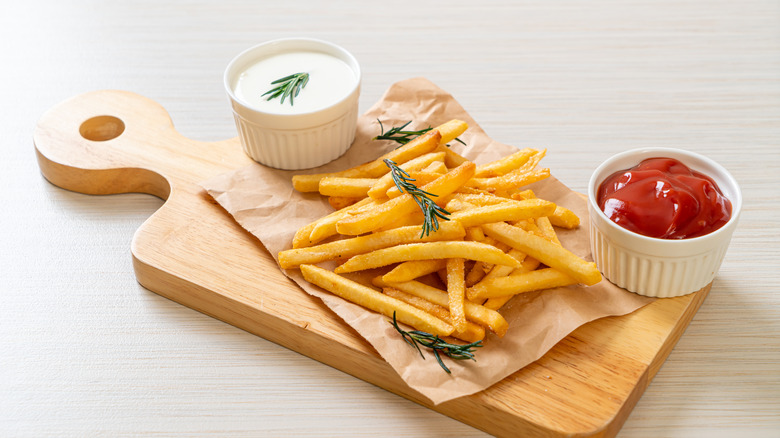The Possible Reason Your Fries Came Out Dark
We may receive a commission on purchases made from links.
French fries, on the surface, don't seem to be too complicated to make. They require only one ingredient and, so long as you have that one ingredient, you really can't mess up French fries, right? But making fries isn't as easy as it seems. There are mistakes that can be made that could mean the difference between a golden, crispy French fry and a waste of potatoes.
If you're making pre-cut frozen fries and discover that instead of being soft and fluffy on the inside, they're filled with oil, it's because, as the Idaho Potato Commission explains, you left your fries out at room temperature. This allows the potatoes to absorb more oil. If you're serving up fries that are on the dry side, Popular Mechanics tells us that it's because you let your oil "degrade," or sit out too long, which in turn dries out the fries as they cook. When preparing fries, it's a delicate balance between heat and time to ensure that your fries come out as crispy as possible.
But what happens when your fries turn that weird shade of dark brown? Instead of getting golden fries, you get these shriveled-up strips of brown, wrinkled potato. What can you do to prevent this? Are these fries even safe to eat?
Don't put your potatoes on ice
Let's say, for the sake of example, you're making homemade French fries. You decide to use these potatoes that you've been keeping in the freezer, under the belief that freezing potatoes will help to ensure that they last longer. While you may not see any difference between a frozen potato and a fresh potato, it's what you can't see that makes all the difference.
As "Dr. Potato" of the Idaho Potato Commission explains, potatoes stored in extremely cold temperatures undergo a chemical change, in which their starches turn to sugars. As the potato freezes, it becomes less "stable," breaking down when a consumer tries to fry or bake them. This means that, when a frozen potato is added to oil or baked in the oven, the starches-turned-sugars will immediately begin to caramelize, leading to that odd brown skin that appears despite the fries not being cooked yet. While caramelization may be good for onions, it's not exactly a good look for French fries.
But are brown fries safe to eat? According to a report from HuffPost, the FDA warns that brown or overcooked fries may have higher levels of acrylamide, a chemical believed to be linked to cancer. While this isn't to say you're going to get cancer from eating a brown French fry, it could be a quick excuse to toss out those overcooked fries and start over.
How else can you keep your fries from turning brown?
Okay, you've made a mental note to never use frozen potatoes to make fries. But even if you've never used frozen potatoes before, you may notice that your fries are still turning brown.
There are actually a few easy things to do when you have freshly sliced potatoes for either French fries or home fries. According to MasterClass, you should brush your potato slices down with lemon juice or vinegar, which helps slow down the oxidation process that turns potatoes brown. You could also try storing your potato slices in a bowl of cold or salted water while you work, as cold and salted water will also help slow oxidation by removing any excess starches while you fry or cook the rest of your potatoes. You can also "blanche" or quickly boil your potatoes before putting them in the fryer, to help eliminate any browning by breaking down certain enzymes (via NPCK).
While some fries may still darken slightly more than the rest, this is nothing to worry about. A few darkened potatoes out of the bunch shouldn't be enough to spoil a plate of crispy, golden, and fluffy French fries.


